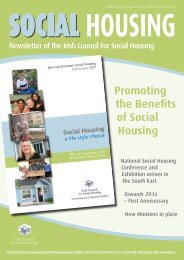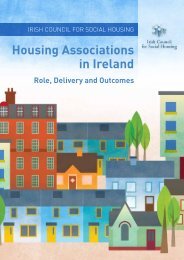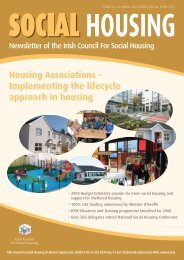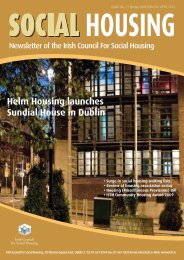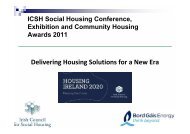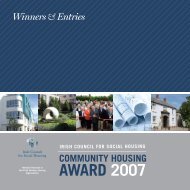National Housing Strategy for People with a Disability 2011 - 2016
National Housing Strategy for People with a Disability 2011 - 2016
National Housing Strategy for People with a Disability 2011 - 2016
You also want an ePaper? Increase the reach of your titles
YUMPU automatically turns print PDFs into web optimized ePapers that Google loves.
eviewed maximum rent limits to reflect reduced rental costs and to achieve maximum value<strong>for</strong> money <strong>for</strong> the Exchequer. While many rent limits were reduced in this review, rates <strong>for</strong>single people living on their own were not reduced in the majority of counties. The rates <strong>for</strong>Dublin were also, largely, unchanged. CWOs continue to have flexibility to take account ofrealities in their own local areas.The Government’s new <strong>Housing</strong> Policy Statement, published in June <strong>2011</strong>, provides <strong>for</strong> thetransfer of responsibility <strong>for</strong> providing <strong>for</strong> the housing needs of long term rent supplementrecipients to housing authorities on a phased basis. This is in recognition of the fact thatrent supplement, although intended as only a short term income support, has become amainstream social housing support. A working group has been established by DECLG, <strong>with</strong>the Department of Social Protection and local authorities, to develop proposals to give effectto this commitment.(f) Supports to people <strong>with</strong> disabilities – consideration should be given as to how bestpeople <strong>with</strong> disabilities can be supported, either moving into, or living in the private rentedsector, including through assisting to move to appropriate accommodation, adjusting tomore independent living, provision of in<strong>for</strong>mation on housing options, tenancy rights, etc,and coordination of relevant supports. While existing housing advice services may provideassistance in this regard, the Citizens In<strong>for</strong>mation Board’s (CIB) <strong>National</strong> Advocacy Service<strong>for</strong> <strong>People</strong> <strong>with</strong> Disabilities, if established, could also play an important role, in addition toongoing supports provided by voluntary organisations, in supporting people <strong>with</strong> disabilitiesin the private rental sector.An initiative to support homeless people in the private rental sector is being operatedbetween Threshold’s Access <strong>Housing</strong> Unit and Dublin City Council <strong>with</strong> the aim ofprogressing the Government’s commitment to end long term homelessness. A need andopportunity was identified to utilise the private rented sector as an interim step <strong>for</strong>ward toimprove the position of long term homelessness. Under this initiative, Threshold sourceprivate rental units in the Dublin area through engagement <strong>with</strong> landlords and tenants.Where necessary, relevant supports are provided to tenants under the Slí Scheme to assistthem progress from homelessness to independent living in mainstream housing.Conclusions5.42 Effectively meeting the housing needs of people <strong>with</strong> disabilities will require a varietyof different approaches in order to deliver the appropriate response and requires a strongfocus on evidence based policy and practice. It is recommended that a pilot programme bedeveloped to test good practice in sustainable communities <strong>for</strong> people <strong>with</strong> disabilities whichcould focus on, inter alia, housing design and tenure, effective interagency cooperation andperson centred responses.62



